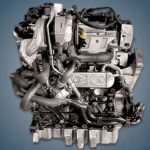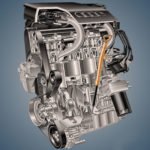The 1.2-liter Volkswagen CJZB 1.2 TSI engine was produced by the concern from 2012 to 2018 and was installed on such popular company models as Golf 7, Seat Leon, Skoda Octavia. There was a slightly more powerful modification of this engine with 90 hp under the CJZC index.
The EA211 series includes: CWVA, CWVB, CJZA, CJZB, CHPA, CMBA, CXSA, CZCA, CZDA, CZEA, DJKA, DACA, DADA.
Specifications
| Production years | 2012-2018 |
| Displacement, cc | 1197 |
| Fuel system | direct injection |
| Power output, hp | 86 |
| Torque output, Nm | 160 |
| Cylinder block | aluminum R4 |
| Block head | aluminum 16v |
| Cylinder bore, mm | 71 |
| Piston stroke, mm | 75.6 |
| Compression ratio | 10.5 |
| Features | DOHC |
| Hydraulic lifters | yes |
| Timing drive | belt |
| Phase regulator | on the intake shaft |
| Turbocharging | yes |
| Recommended engine oil | 5W-30 |
| Engine oil capacity, liter | 3.8 |
| Fuel type | petrol |
| Euro standards | EURO 5/6 |
| Fuel consumption, L/100 km (for VW Golf 2016) — city — highway — combined |
5.9 4.2 4.9 |
| Engine lifespan, km | ~250 000 |
| Weight, kg | 104 |
The engine was installed on:
- Seat Leon 3 (5F) in 2012 – 2018;
- Skoda Octavia 3 (5E) in 2012 – 2018;
- Volkswagen Golf 7 (5G) in 2012 – 2017.
Disadvantages of the VW CJZB engine
- The main problems are associated with the oil burner, especially for the early versions of the engine.
- There are also a lot of complaints about accelerated carbon formation on the intake valves.
- Next comes the often sour and jamming rod of the turbine wastegate actuator.
- After 100 thousand km, an expensive pump with two thermostats often already leaks.
- The timing belt is designed for a mileage of approximately 120,000 km, and when it breaks, the valves bend.






